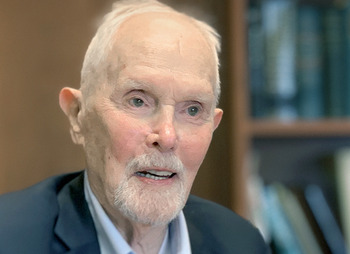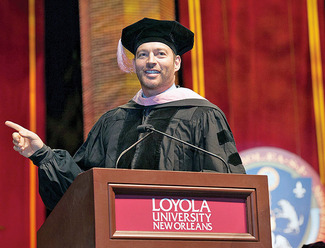
A platform that encourages healthy conversation, spiritual support, growth and fellowship

NOLACatholic Parenting Podcast
A natural progression of our weekly column in the Clarion Herald and blog

The best in Catholic news and inspiration - wherever you are!
Harry Connick Sr. modeled a path to charity
-

In the eyes of his singer-songwriter-actor son, the legacy of Harry Connick Sr. unfolded quietly, in the parking lot of a Lakeview grocery store.
One day as a kid, Harry Connick Jr. and his older sister Suzanna were sitting in the back seat of the family car, with their dad and mom in the front seat, as they headed toward Harrison Avenue.
“We’re pulling out, and some elderly woman’s putting her groceries in the trunk,” Harry recalled in an interview with Christopher Closeup in 2022. “My dad would stop the car and say, ‘Go help that lady.’ … So, you go out and do that. And you get that drilled into your head, and it feels good to do those types of things.”
Doing good things, especially when no one is watching, became the Catholic family catechism Connick taught by modeling, not by preaching.
The man who toiled inside the cauldron of good vs. evil for 30 years as New Orleans district attorney – and who in his retirement doubled down on his devotion to the church – died Jan. 25 at the age of 97.
“He basically lived his faith, and his faith informed every decision he made,” said longtime assistant district attorney Ralph Capitelli.
At 93, Connick wrote what he considered were among his most important briefs – a devotion he called “The Spiritual Mysteries of the Rosary” – and brought them to a large jury of his peers at St. Dominic Church. Connick’s five rosary reflections touched on the power of the Holy Spirit through the prophets, the Incarnation, the gifts of the Spirit, the fruit of the Spirit and the forgiveness of sins.
“My dad is my spiritual hero,” Harry said. “His faith is stronger than almost anyone I’ve ever met.”
Connick’s appreciation for the rosary started as a child in the home, first in Mater Dolorosa Parish and later at St. Dominic when his family, which ultimately included six boys and two girls, moved to Lakeview.
His father, James Paul Connick, was a civilian employee of the U.S. Army Corps of Engineers, and there was a routine the family followed religiously each evening.
“We would eat dinner around this big oak table,” Connick recalled in a 2019 interview with the Clarion Herald. “After dinner, we would get up from the table and go up to my parents’ bedroom. We would kneel at the foot of the bed. There was a big picture of the Sacred Heart of Jesus on the wall. With eight children, we had a lot of friends. Our door was always open, as all doors in Lakeview were at that time. Our friends would walk in and hear us reciting the rosary, so they’d just come up the stairs and join us. Sometimes that bedroom got pretty crowded.”
Connick got his inspiration for the new rosary devotion as he read a missalette in Mass in 2010 and compared, side by side, the Apostle’s Creed to the Nicene Creed, which was much more expansive on the role of the Holy Spirit in salvation history.
That got him thinking about the current set of rosary mysteries – the Joyful, Sorrowful, Glorious and Luminous. While the Holy Spirit is referenced in the Annunciation (the Incarnation), Connick said he “felt that the Holy Spirit and the Incarnation deserved more than just a passing mention.”
After more closely reading the 20 current mysteries of the rosary – as well as reading Old and New Testament passages about the Holy Spirit – Connick said “it became obvious to me that some of the most fundamental mysteries involving the Holy Spirit which are related to our Catholic faith were not included. I wondered if I could do something to bring about more attention to the importance of the Holy Spirit.”
Harry Jr. took a far different path to his Catholic faith. His mother Anita, herself an attorney and a judge, was born Jewish but was non-denominational by the time he was born. Harry was 13 when he was baptized and confirmed. His mother died right around the time he went to Jesuit High School, and his precocious musical talent set him on a path to the New Orleans Center for Creative Arts and, at 18, to New York City for classical music training.
Such a bohemian career path did not fluster his father in the least.
 ‘Summa cum later’
‘Summa cum later’Dressed in a black academic robe as the recipient of an honorary degree from Loyola University New Orleans in 2016, Harry told his “fellow” graduates: “I graduated summa cum later. … It’s crazy. My mom was a judge. Imagine my delight when I was old enough to realize that my parents had the ability to both prosecute and imprison me. My teenage years were basically a combination of plea bargaining and community service.”
As Harry looked out at his father, he turned serious. He recalled coming to New Orleans to shoot a film after Hurricane Katrina and seeing a homeless encampment under Interstate 10 at Canal Street and Claiborne Avenue.
He decided to go to McDonald’s early one morning and buy “100 Egg McMuffins and a whole bunch of coffee.”
He drove his car under the bridge and started handing out the food. The homeless persons came up, silently, took the muffins and coffee, and walked away.
“They all just kind of looked at me,” Harry said. “I wasn’t looking for gratitude, but it still surprised me.”
Harry said he had been taught at Jesuit never to perform charitable acts in expectation of praise, but the response he received under the bridge bothered him for months. He decided to discuss the situation with his dad.
“He always has a great perspective about things, but as I told him the story, I actually became more interested in trying to impress him with my act of charity than getting his perspective,” Harry said. “I was craving his approval. I couldn’t wait for him to tell me how proud of me he was.”
Then Harry Sr. said something that left his son speechless`.
“I know,” Harry Sr. told his son. “The same thing happened to me when I brought them food.”
Preach the Gospel at all times; when necessary, use words.
“Catholic families are just brought up in a certain way,” Harry Sr. said. “We recognize we have a lot to be grateful for ourselves, and we should share with others who don’t have it. It’s not simple, but it’s that simple.”




